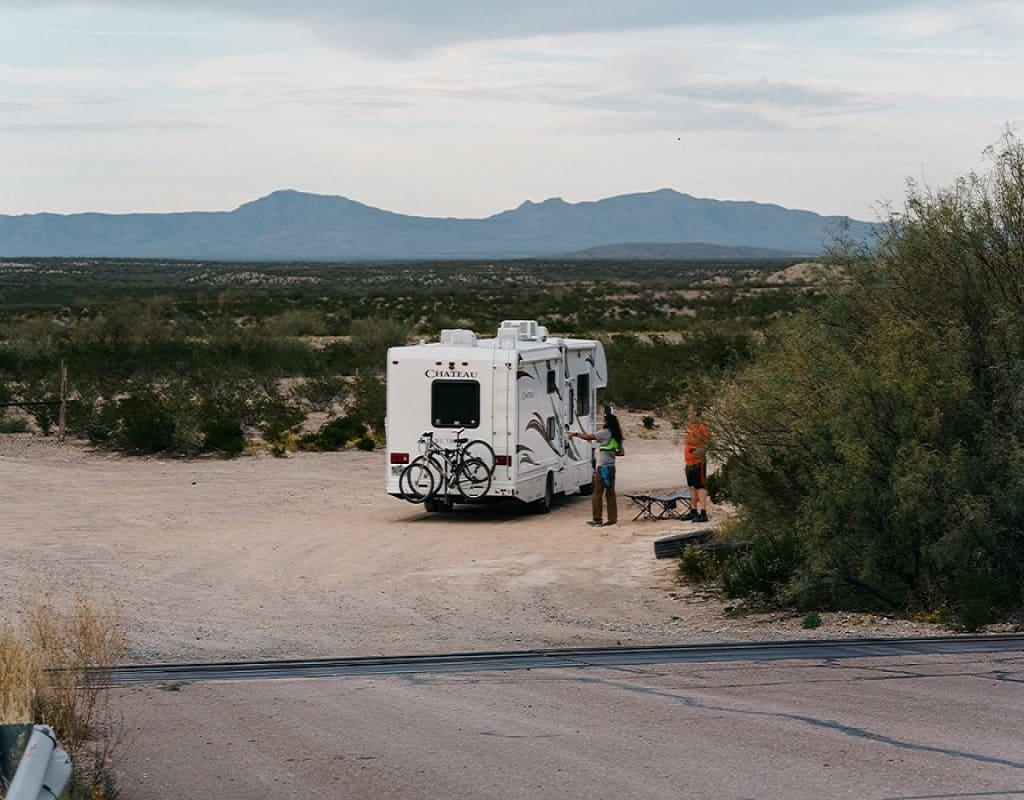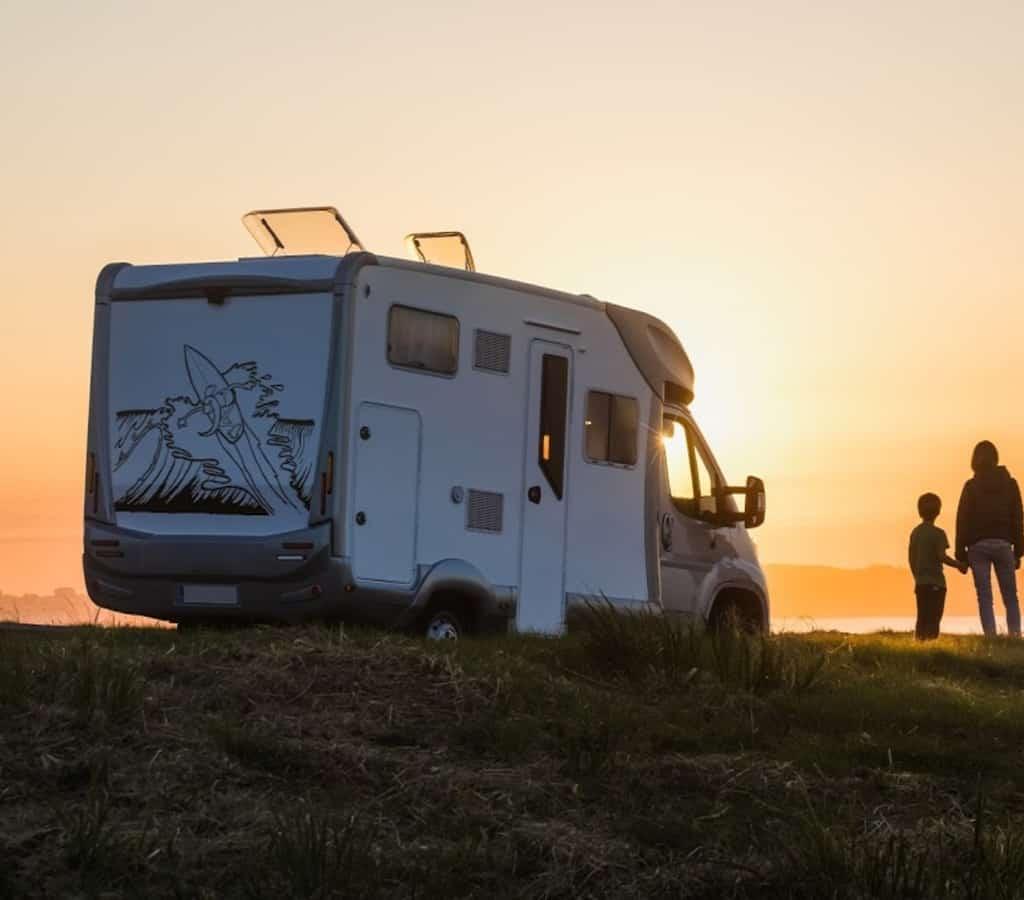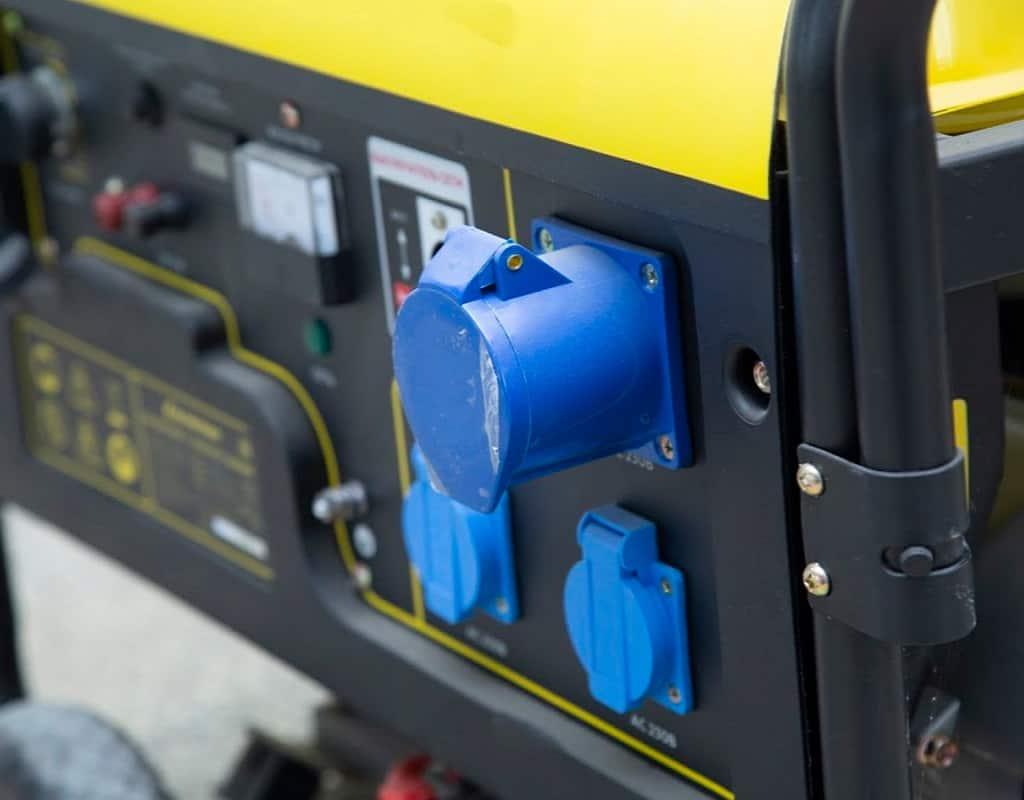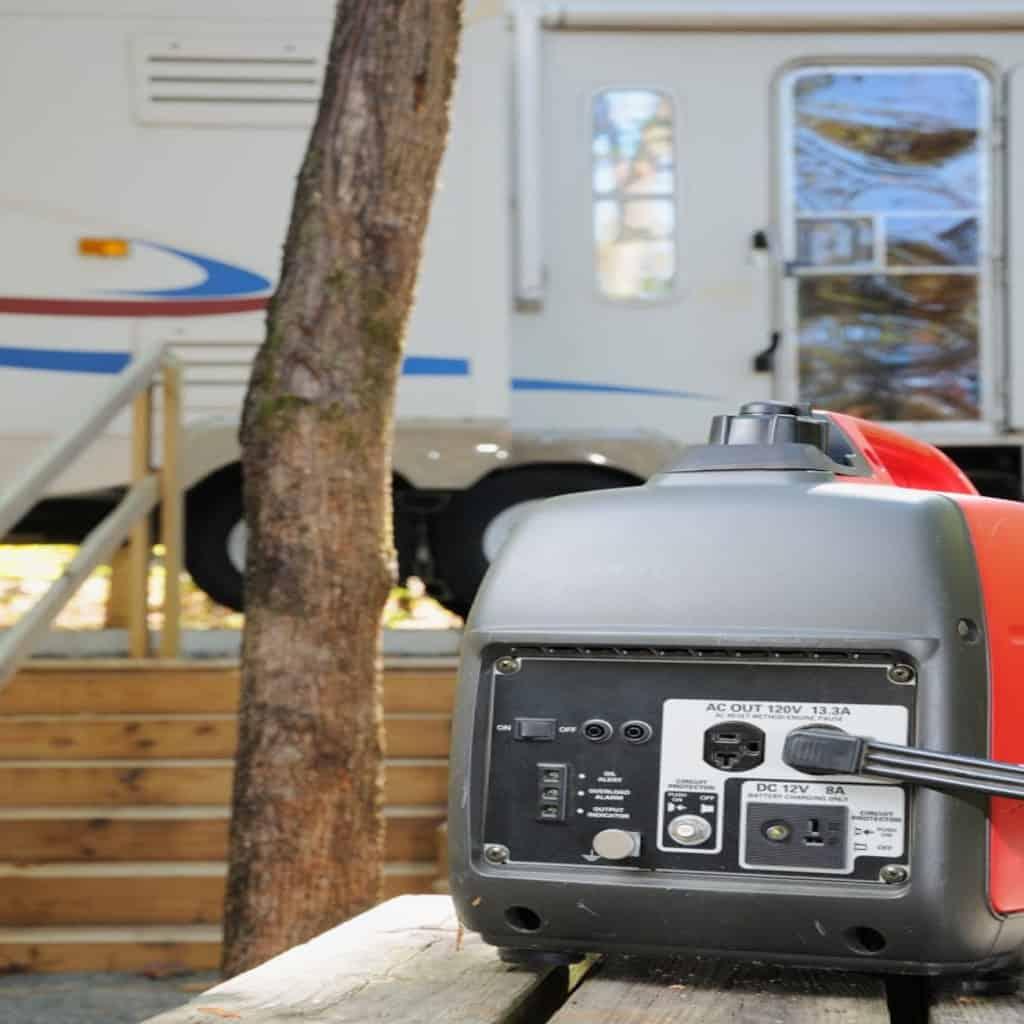Sharing is caring!
How Long Do RV Generators Last?
Whether you’re exploring an area where you will knowingly be far from amenities including external power sources, or you are experiencing an unexpected power outage where you’re hooked up, backup power with a generator is an important asset for your RV.
With a properly sized generator and battery bank, you should be able to run your generator for 8 to 20 hours. With the right set up, 8-10 hours should properly re-charge your batteries for overnight use.
Not every campsite or area you will want to visit will be outfitted with onsite power. This is especially true if you plan on boondocking, or off-grid camping. A generator helps ensure that you will be able to power all of your appliances and modern day conveniences despite your proximity to shore power or hook-ups.
But what is equally as important as your RV being equipped with a generator is understanding how to choose the proper size, knowing what they can power, and how long they can run safely.
This article outlines the two different RV generator types, their running lengths, how to choose the appropriate size and type for your RV, and some safety tips and operating advice.
Types Of Generators and Their Run Times
The two different types of RV generators are a built-in generator or a portable generator. A built-in generator is installed directly into your RV. It is hardwired straight into your RV’s electrical system and is started by your vehicle’s battery.
They will run on gasoline, diesel or propane, and can draw their fuel straight from your RV’s fuel tank. So there may be no outside tank that you have to fill, and there is no manual set-up. They are simply the push of a button away from firing up.
Alternatively, a portable RV generator operates more independently. They are situated outside of your RV, and have their own fuel source. (One that does not draw from the fuel tank of your RV.) A portable RV generator has easier access, as it is not inhibited by where it is secured within your RV. This can be a gas generator, or propane. There are even some that have dual fuel capability.
Often, a built-in generator is secured within a designated generator compartment where outside access can be limited. A portable generator can also be a bit easier to ventilate, as they are not permanently secured within a close proximity to your RV’s windows. It is important to be aware of your generator’s exhaust fumes and to prevent them from filling the inside of your RV.

Similar to a built in generator, a portable RV generator will run on gasoline, diesel, or propane. Some models are even dual fuel, and they are able to run multiple different fuels. Most commonly, they switch between gas and propane.
How long can you run an RV generator? The exact run time for your generator will depend on multiple factors including its wattage, the total wattage of what you’re powering, how large of a fuel tank it has, and which fuel you’re using.
Depending on their size, portable generators can hold anywhere from 1 to 10 gallons of fuel. You can expect to get approximately 8-13 hours on average of non-stop power from a portable generator and built-in generators can run nonstop for days, with proper maintenance.
How Long Is It Safe To Run An RV Generator?
It is safe to run both built-in and portable RV generators for their 8-24 hours of run time expectancy as long as they are being properly ventilated, have enough fuel (are not “running on fumes”), and are properly outfitted for use in extreme weather conditions.
Why Do Generators Need To Be Shut Down
While your generator may be able to remain running, especially if it is a built-in generator, there are specific times when they need to be shut down.
Portable Generator Limitations
While a portable RV generator is indeed a significant asset, they do have their limitations. Depending on their size, you may only be able to power your absolute essentials. They offer a limited power supply, and need to be shut down and refueled more often than a built-in generator.
Plus, a portable RV generator will require manual set-up and operation. It needs to be removed from where it is stored, to be hooked up, and to be filled with fuel before operating. Whereas, a built-in generator is started with the simple push of a button.
Most generators are not designed for continuous operation. They do need to rest. Check your manufacturers recommendations for run lengths. More than likely your local “quiet hours” will take care of this anyway.
Weight is something important to consider when investing in a portable generator, as they come in a wide range of sizes. Consider choosing one that is a weight that is manageable for you to move.
The more powerful the generator, the larger and heavier the generator is likely to be. Portable generators are most often used to power Travel Trailers and Fifth Wheels, or RVs without their own fuel source.

Quiet Hours
When purchasing a generator that will be used for camping, many people prioritize choosing a model that is quiet. This is a benefit for those using the generator and for your campground neighbors. Most campgrounds have quiet hours, or hours reserved to reduce the noise you are making in order to be courteous to those camping nearby. It is a good idea to learn what these hours are, and abide by them.
It is important to observe RV campground etiquette, and to follow the rules of the campground in which you are staying. It makes the experience better for everyone in the campground. Do not run your generator after quiet hours, no matter how quiet you think it may be.
Never run your generator while overnighting in a Walmart parking lot, or other retailer. It os not appreciated and will ruin this benefit for everybody!
Related Articles
- Average Camper Weight
- Must-Have RV Accessories
- How To Stop Your RV From Rocking
- Hiking Bryce National Park
- RV Length For EVERY National Park Campground
- Best RV Destinations For This Year
Refueling
Before refueling, gas generators need to be shut down, and cooled off. Gasoline fumes are extremely flammable and can be lit-up from a single spark. You do not want to take the chance of the heat from your generator igniting them.
A built-in generator draws fuel directly from your RV’s fuel tank, so refueling is the same as filling your vehicle. Your built-in generator will even automatically shut off when your fuel level is down to one quarter of your tank, so you don’t accidentally empty your entire fuel tank.
You want to avoid allowing your built-in or portable generator to completely run out of fuel while it is operating under any load. Doing so can cause your generator, and the appliances it is powering, to sustain major damage.
Refueling your portable generator is a little different, as it has its own fuel tank that is independent from your RV’s. Again, allow your generator to cool for an absolute minimum of 10 minutes before attempting to refuel.
Be sure to store your portable generator with an empty fuel tank to ensure you don’t have any gas breaking down inside the generator.

Life Expectancy
Depending on their frequency of use and how well they are maintained, most portable generators have a life expectancy of 10,000 to 25,000 hours, and built-in generators have a life expectancy of between 15,000 and 20,000 hours.
Generators built specifically for RV use are made to last for years, but both built-in and portable RV generators require proper maintenance to keep them functioning optimally. Make sure to change the oil and filters, and to check the fuel lines of your generator on a regular basis. Routine maintenance can extend the life expectancy of your generator, and allow it to work more efficiently.
Also, lack of use is a major cause of problems with generators, and it can happen in as little as one month. The fuel, mainly gasoline, begins to break down, becomes sticky, and inhibits proper flow.
This can create start-up problems and can cause surging. A great schedule to follow is to run the generator with at least a 50 percent load for a minimum of two hours, every month. This also eliminates potential moisture build-up, prevents carbon build-up, and lubricates all of the engine components. If your generator is running efficiently, it can lower your overall fuel consumption.
If your built-in generator is in need of repairs, and you aren’t about to fix it yourself or have access to a mobile RV repair service, you will wind up taking your entire rig to a mechanic.
However, If your portable generator is in need of repairs, you can bring solely the generator to the repair shop and you can do so with any vehicle that has the space to accommodate it.

How To Find The Portable Generator You Need
One of the first things you need to do is determine the amount of physical space you have to store and transport your generator. It is counterproductive to determine how big of a generator you may need if you are unable to bring it with you on your adventure because it doesn’t physically fit.
Commonly, those who have a designated compartment opt for a built-in generator. These compartments are typically installed in RVs that would benefit from having a higher powered, built-in generator. RVs such as those that are outfitted with multiple air conditioners, or high wattage refrigerators. A larger generator is required to handle these appliances.
Next, determine your power needs. The minimum wattage you need is determined by adding up the starting wattage requirements of every appliance you wish to run simultaneously. Then, to be safe, add a 20% buffer to the total.
The starting wattage, especially for your appliances with a compressor, are much higher than that of their running wattage. Start-up and shut down cycles can double or triple the wattage draw. For example, depending on its size, an RV refrigerator uses 400 to 1000 watts of electricity, and an air conditioner uses anywhere from 1,400 to 2,400. This doubles or triples upon start-up and shut-off cycles.
Then, determine your desired fuel type. Multiple factors may play into this decision, including where you will be exploring, your set-up, and what makes economic sense for you. Gas is less inexpensive and easily accessible, but it burns quickly. A dual fuel generator can run on both gas and propane and gives a lot of flexibility.
Propane has a longer shelf life, and burns more efficiently than gas or diesel, but it outputs 10% less power than them both. Diesel generators burn cleaner than gas powered generators, and outputs more power than propane, but it is more expensive.
If your RV has its own fuel source, It makes sense to choose an RV generator that uses the same fuel type, as doing so can eliminate the need to store and transport multiple different fuel types. Please note that due to its flammability, it is not recommended to store gasoline inside of an RV.
Once you have figured out the best fuel option, you can choose a gas, diesel or propane generator, or even a duel fuel model. Remember if you are using a portable unit, you will need to carry additional fuel in a gas can or propane tank.
Many people these days choose an “inverter” type of generator. They tend to be smaller and much less noisy that traditional generators. They also deliver clean “Sine wave” power which is safe for todays sensitive electronics. This does come at a price, but careful shopping can find good deals on the better equipment, like the Champion “Hybrid” model listed below.
Our Recommended Generators For Each Fuel Type
On Board Generator
Small Portable
Large Portable
Dual Fuel Option
Tips For Shortening Run Time and Saving Money
While there are some unavoidable expenditures that are necessary when heading out on an RV adventure and running your generator, there are measures you can take that can reduce, or at least not add, to the overall cost of powering your appliances.
Run Major Appliances Sparingly
One way to shorten generator operation time is to only run the appliances that require the most power, such as your air conditioner, refrigerator, and hot water heater on an as needed basis, as opposed to continuously. Using them sparingly will reduce the amount of time you have to run your generator, and will require less wattage, and use less fuel.
While it is safe to run a built-in generator while driving, you will want to consider how much fuel you will be using. On average, you will be using close to one gallon per hour, depending on what you’re powering. If you’re hoping to save some money and fuel, consider only running what you absolutely need. Many RV sites are not too near the gas station.
Run Fridge and Hot Water on Propane
Some appliances, such as your water heater and refrigerator, may be able to run on propane as opposed to needing to be exclusively run by your generator. Opting to do so can reduce the load and the amount of strain you are putting on your generator. This will reduce its run time, and reduce the amount of gasoline or diesel fuel you use.
Using less fuel means the generator can run for a longer amount of time before you need to refill it, and it saves you money.
Keep RV Closed When Using AC
Leaving doors and windows open while running your air conditioning can become an unintentional oversight that leads to increased strain and fuel consumption of your generator. Making sure windows and doors are tightly sealed and closed as much as possible while using your air conditioner is a great way to reduce the use of wasted energy.
You do not want to add to your overall fuel consumption if you can avoid it. Regularly check seals and cracks around windows and doors as well. A few moments of maintenance can save you money in the long run.
Replace Lights With LEDs
While your RV may have come from the factory fitted with the initially less expensive incandescent or fluorescent light bulbs, LED bulbs are much more energy efficient, are more durable, and have a significantly longer lifespan.
In fact, LED bulls are 80-90 % more efficient, while using only a fraction of the energy. This decreases the amount of wattage required to power your lights, and helps you conserve energy, and generator fuel. Plus, if they have a longer lifespan, that means you will be changing your lightbulbs less often, and will be spending less money.
Utilize Solar Panels
Depending on your power needs, you may benefit from the use of solar panels. A solar system can charge your batteries efficiently during sunny periods and reduce or even eliminate the need for a generator.
Can You Run A Generator While Driving?
It is safe to run a built-in generator while driving. In fact, it is actually more fuel efficient to use your built-in generator to power your roof mounted air conditioner, then it is to run the dashboard air. A built-in generator is affixed to a specific area, is well ventilated, and shares the same fuel tank as your RV, so it is able to run safely while you are traveling.
However, it is not recommended to run a portable generator while driving. It is far more difficult to do so safely. You run the risk of filling your RV with deadly carbon monoxide fumes if not properly ventilated, and risk spilling fuel or inflicting other damage upon your RV if it is not properly secured. It’s simply not worth the risk.
If you are concerned about the contents of your refrigerator getting too warm while you’re traveling, you can use coolers filled with ice or ice packs to keep your food fresh.
Summary
While not every destination where you desire to camp will have access to electrical hook-ups, having a generator helps enable your independence, and allows for more expansive travel. They also make you better prepared for a potential power outage.
Built-in generators are a bit more powerful than portable, and are better able to handle higher wattage requirements, while portable generators are better suited for smaller rigs with less power needs.
Knowing the dimensions of the space you have to work with, and the total start-up wattage requirements of the appliances you wish to power, are the keys to choosing a sufficient generator for your RV and meeting your power requirements.
Running at full capacity, you can expect both a built-in and a portable generator to use close to one gallon of fuel per hour. The amount of fuel your generator can hold, the type of fuel you’re using, and the wattage of the generator all play a role in your generator’s running time.
While you can expect to get an average of 8-13 hours of uninterrupted running time with a portable RV generator, and 8-24 hours with a built-in RV generator, there are some simple measures you can take that will help reduce your generator’s running time and extend its life expectancy.
It is extremely important to follow safety guidelines when operating your generator, as when a generator is running there are toxic carbon monoxide exhaust fumes to be aware of, and flammable gasoline fumes when refueling. Following these guidelines will help keep you and your family safe, and allows you to have continued opportunities to take amazing adventures in your home away from home.
How Long Can You Run an RV Generator For?
Now that you understand the things to consider for your new generator, start shopping. A good place to start is by speaking to your RV dealer about requirements and the type of camping that you wish to do. That way you can make sure you have as much power as you need on your next camping trip.
Sharing is caring!

